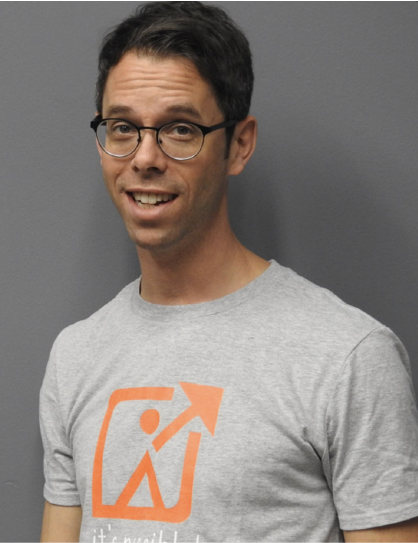When your grandfather was hired, there was an unspoken idea that it was a job for life.
Decades later, a lot has changed. The average tenure for a 25-34 year old is 2.8 years. More and more people are finding freedom by creating their own work, freelancing, or providing independent consulting.
Yet, as digital leaders, we can be shocked when someone leaves after 2 years, or wants more flexibility.
How should we approach the changing opportunities in the market?
Stephen Warley is the Founder of Life Skills That Matter, and is on a mission to help people create work that works for them.
Who was work built for?
Stephen says that the current work system was never designed for workers, but for organizations. Employees are expected to adapt to all the anxiety that comes with the large transitions that happen at the corporate level.
Stephen works with people to help them learn how to work for themselves, but he’s not anti-employment. He encourages CEOs to rethink what a human-centric approach to employment and hiring would look like.
When hiring in a digital age, you can’t hire a cog that will fit in a wheel, but you need people who are creative and can act with the intelligence and boldness that comes from owning your own career.
Hiring people who own their career
There is a freedom that comes from stepping outside of the safe corporate world of a regular paycheck. People who spend time there learn about risk taking and often have more context they can bring to your specific challenges.
When interacting with these people, you’ll need a flexible approach to hiring. Benefits like employer-based health insurance will hopefully be addressed at a national level, and conversations about employment can have a lot more options.
This model of working can help historically oppressed groups who have had to hustle to make work for them. However, we need to be intentional and set up systems that help people know what skills we need and how we can adjust our cultures.
Digital leaders who worry about building a culture among people who don’t have a lifetime commitment to the company should remember that most people aren’t likely to stay more than 4 years. Good culture practices should be in place whether or not people are together for 6 months or 50 years. Giving people the option of whom to work with and not punishing them for leaving is a better system we should explore.
Links
Quotes
2:19 – “It is more important to start building a team of people who can think for themselves, manage themselves, and solve problems very quickly in the face of what I call a permanent state of accelerated change. They do not want to hire; they’re not hiring cogs anymore.”
5:12 – “Right now, our entire economy is organized around just thinking about artificial intelligence and automation. It’s not about thinking about how to make society better for all humans, and that is a problem.”
“There is a greater likelihood of expanding the network of your company by loosening the reins and not having them imprisoned in an office all day.”
Today, our guest is Stephen Warley. He is the founder of Life Skills That Matter. Hey, Stephen, how are you doing today?
I am amazing. I just want to say I’ve been on a lot of podcasts, and I’m glad we had a chance to chat before, but you sent some pretty, pretty provocative questions that I needed to really think about how I want to answer, and I really appreciate that you did that.
That’s an honor because you are a provocative guy yourself. So, to be able to provoke you is something I didn’t really intend. But go and tell us about yourself and about your company, what you do.
Sure, I’m on a mission to help people create work that works for them, because I like to remind people that the current work system that you exist in was never designed for you. It was designed for the needs of corporations, organizations, and companies. Their needs are changing very quickly. A lot of economic changes are happening, and we’re all feeling more and more out of alignment. That’s exhibited as anxiety, and overwhelm, and stress, and not feeling enough, depression, all these things. I think every one of us is experiencing one of those things by now. We’re like, oh, my gosh, it’s me, I’m the problem. But it’s not; we just have massive changes going on in our economy. I generally advise people to consider working for themselves. I think that’s the fastest way to kind of rip off the band aid to really understand how to adapt to how the work is changing, whether you end up doing that for the long term or not.
Now, Stephen, I think you’re scaring the kids a little bit. Most people who listen to the show are CEOs of growing companies trying to build a digital workplace. If you’re telling people that they should just go off and work for themselves, it’s kind of at odds with what these people are trying to do in terms of building a vibrant atmosphere. Why should they keep listening?
Because I know the really forward-thinking, innovative CEOs who listen to your show realize that it is more important to start building a team of people who can think for themselves, manage themselves, and solve problems very quickly in the face of what I call a permanent state of accelerated change. They do not want to hire; they’re not hiring cogs anymore. They know that, especially in the digital space. Also, a lot of the teams that they’re running now are going to be working remotely, so they need to be able to have these folks managing themselves, be motivated on their own, or to even inspire other people on their team to get motivated, because the boss man can’t do it all anymore.
When you talk about the people who are self-managed—you’ve interacted with a lot of people over your career, trying to help them to walk in this path—what are the signs that somebody can do that, can see problems for themselves, can solve problems for themselves, can go about this? What are those kind of general characteristics you see?
By the very nature of being a human being, we all have a capacity to survive. It is an instinct; we are hardwired for it. We, again, have just been raised in an economic system that has told us, “You can’t; you need us. You need to follow the directions, keep your head down, and just refer to the authority.” That message is still being sold to us to our detriment. We don’t need that anymore. We need to tell people—You have amazing natural gifts inside of you. Now, I’m saying those gifts are infinite, varied, and maybe they haven’t been doled out very fairly to everybody. We also live in a system that only prizes intelligence, and there’s many different types of gifts and skills that we really need to start looking back to and toward again. I think there’s varying degrees to the success of how people want to manage themselves or how effective they will be, but I think more people have the capability of managing themselves than they were led to believe.
Let’s jump into this idea of intelligence because, on one level, I might agree with you, but I might not, so I want you to explain what you mean by that we only value intelligence.
Have you ever hired an electrician, or a plumber, or somebody to clean your gutters, and you just got to chit-chat with them, and you came away with them being like, “Wow, they are amazing! I had no idea what is that they do”?
Sure, yeah.
Again, a lot of us assume different professions don’t require necessarily a lot of intelligence.
Until you actually start to try to become a plumber yourself. Then you realize you have no clue what’s going on.
I happily call the plumber, happily. I had the same guy back in Boston for like 10 years, you know what I mean? I would have referred him to everybody in my neighborhood because he was that good. There’s the old story that people would say—For the next 30 days, do you want all the cardiologists to go on strike, or do you want all the sanitation workers to go and strike? And then everybody’s like, “The cardiologist; I’ll take my chances. Like, I bet if I get a heart attack or not, right?” Right now, our entire economy is organized around just thinking about artificial intelligence and automation. It’s not about thinking about how to make society better for all humans, and that is a problem. We are creating a problem. We’re making the problem worse.
Yeah, but I do think, and I’m going to stay on this word, intelligence, because I feel that a lot of people are hiring. Like, I just want to find a smart person for this role.
What does that mean?
Yeah. Exactly.
What on Earth does that mean? Because I know I would want to peel away. It’s like tell me about your needs. Think of a worker in the past year where you’re like, gosh, I would love to hire 10 more people like this. Well, what characteristics did they have? What was their value? And when you start peeling that back, Neil, that’s when you start seeing like emotional intelligence, their soft skills on their ability to get things done, their ability to problem-solve in the moment or to console a fellow coworker to get them back on track. You don’t want just to have an entire team of people who have 1600 on their SAT scores, maybe your engineering team, possibly. But that is not necessarily the only thing. Again, back to if people are going to be managing themselves, people who are just purely book-smart aren’t always the best at managing themselves, because they’re so cerebral and just lost in the clouds that we need them to be there.
Now, I can say I was one of those people that did really well in school. I was very book-smart. I found less use for that skill and almost less hireable. Because the reason I was book-smart, the reason I got good grades, is because I knew the system. The system was set up. The system was understandable to me. I got it; I understood it. I knew how to excel in that. Then I entered into a world where there was no system. I had to create the system on my own and try to figure things out. I really struggled for many years and that to figure those things out. I feel like, in some ways, being good at school impaired me for a lot of parts of the business world. There are probably still some functions in business that, hey, the system’s set up; here’s what you got to do succeed; just do it; follow the plan.
Well, because you were educated to survive in the system.
I always tell people—Think of the system as the zoo. It seems secure and stable, like your food’s delivered a certain time, you know your role, you know what you’re supposed to do. But then one day, you get thrown out without notice into the jungle, like I did when I got laid off 20 years ago, Election Day 2000. It took me five years. I’m like, wow. I mean, “I’m out in the jungle”; everything’s unpredictable. What’s going on here? But now, what I would tell people is, every time you get a new job, you have to learn that micro system, that native system, every time you get a new job. But like you and I, now, we’ve created our system for the rest of our lives. Not saying that’s not going to change, but we’re going to be more nimble and be able to adapt more quickly than being stuck in somebody else’s system.
That is the huge advantage. I always tell people—You’re going to be stressed out one of two ways, either constantly figuring out somebody else’s system, or just take a few years to build your own system. That’s the difference.
It’s true. So, when you tell people it’s going to be better to work for yourself, when you’re telling CEOs, hey, you need to think about hiring people who are self-managers, these independent thinkers, let’s address one thing. One is this unnecessary coupling that we have with health care and employment. You have to have a job to get benefits.
That’s going to end. I mean, it’s only a matter of time. I mean, let’s even put that out there. There’s no defense of that system anymore. I think a lot of people who are employed have figured that out, too, because they’re seeing their deductibles go up; they’re seeing the benefits, that their employer-based health care insurance is going down. So, even people who are employed realize this system is not as great as it was once sold to me.
Let’s imagine that we’ve achieved that solution; health care is no longer tied to employment. Now, we have CEOs and digital leaders out there who are trying to figure out who’s going to be better as a full-time employee and who’s going to be better as a contract worker. What’s going to be better for them? When you remove that system of health insurance, we take that conversation out, I feel like it’s a less dangerous conversation to get into. I would like your opinion on how do you define the difference between the two, and what works for one or the other?
I’ve always kind of looked at it in two ways, two types of workers in another way. There’s the starter, problem-solver, creative people. And then, once it’s kind of created, they get distracted and bored, and they like to pass it off to the maintainers, the executors, the keep-it-going people. But I think those are the two roles, and we need both of those people in the world. I think, sometimes, maybe the maintainer, keep-it-going people are looked down upon by the starter, creative people. I think that’s horribly unfair. We need both of these types of workers.
If you’re talking to CEOs who are leading these teams, does that mean like once you find, “Hey, I got my system down. I just need those maintainers, so I’m going to enter into, for lack of a better term, a long-term contract with this person, that looks like a full-time employment as it is,” as opposed to, “Hey, I got an idea for something. I’m not sure if it’s going to work out yet. It may be a big thing, it may not, but I’m just going to hire in these kind of short-term contract people to try to figure it out.” Then, if it works well, then I’ll either keep them on or find on Google to maintain it. Is that the model you’re thinking of?
Yeah, I think it’s just like you have your startup people, which has a different skill set than the people who actually then build your infrastructure and your systems, right? Well, this is what I’m always teaching in our accelerator. There’s kind of like the research exploration phase of your business, and then you got to start thinking of setting up your habits of processing your system for the long term because that’s how you create value.
No, it’s really a fascinating conversation to have because, again, I think that health care piece is like the biggest one. I’m sure there are other issues out there about, you know, if somebody’s 1099 or if they’re W-2. There’s some tax implications; we can figure those things out, too.
No, I mean, but the number one question I get that holds people back from working for themselves, even if they’re deeply interested, is the health care question.
The other thing that I think comes up is they’re concerned about consistency of being able to pay their bills. If we could remove those two blocks, I think we could have a lot more innovation and creation again. I mean, I’ve seen studies, maybe you’ve had too. It’s just disappointing. From all that we talk about entrepreneurship and all the digital developments and innovation we’ve had in the last 20 years, actually, the rate at which the average American is creating businesses is declining. That is not a good thing.
Yeah, absolutely, and I think, as we look to build more teams of work, like you said, we’re going to have people to have both skill sets. Let’s move to another topic. You and I are both white men. We were able to bounce back from situations. We found it maybe difficult, but not impossible. This kind of new world is exciting to us, but let’s think of it from other people’s perspective. How does maybe project-based work help and hurt groups that have been historically oppressed?
Yeah, every time I go to any type of tech or entrepreneur marketing conference, it’s like, oh, my gosh, it’s just a bunch of white guys. It blows your mind, so unrepresentative of the United States. You know, this idea of “create work that works for you” is very attractive to women, people of color. You know, we attract more of those folks to work the work that we do, because the system was never created for their needs at all. I think, in the short term, when I’m hearing from women and women of color especially, I’m not sure if you realize this, but in terms of all demographics in United States, women of color, specifically black women, have created more businesses faster over the last decade than any other group.
Yeah, they’re the ones that are actually creating businesses.
Yeah, and they are incentivized to do so because conventional work is baloney to them, right? I think that, in the short term, there is this idea of creating work that works outside of the system, project work. This is a bonus. I think where I would caution folks is if you have lower skilled, kind of gig work things, Uber drivers or delivery folks that are people who are shut out or don’t have as many conventional work options. I think those folks get taken advantage of.
That is not cool. We need to protect them and think about that, so I think it’s not an either-or. I think it’s a grey area. I think there’s a lot of pros, and I think there’s cons to be aware of, too.
Yeah, it seems positions like Uber drivers and delivery drivers are in our current world essential. But it’s the worst of both situations when they say, “Okay, we’re not going to treat them as employees.” They’re not going to really have the benefit, and to be able to leverage, and negotiate, and to show more value in the work they’re doing.
This is my idea. I feel like all gig workers have that level of like it’s a platform, and people are just almost essentially being paid an hourly basis. I think it’s up to Uber, and Lyft, and Seamless, any delivery service, TaskRabbit. I think there should be training and education to teach them about this opportunity properly. An Uber driver has to really understand the full cost of impact on doing this opportunity. It’s almost like the warning label on cigarettes.
I think we need to do a better job of informing people. That could be their first opportunity, but then how could they then develop skills and relationships to then truly build their own business and make more money?
Yeah, I mean, Uber is great for getting extra money if you have a car that’s working and you don’t plan to maintain it. If all that things are good, then you can make a decent amount of money. But there’s a lot of ifs in it. Cool, yeah, I think this idea about project-based work, in some ways, like you said, is liberating to people. They can see advantages in it that weren’t there before.
I could never go back to an office. I would love to do a documentary of me going back to an office in 30 days. I would feel like I’m a wild animal in this very domesticated setting, because I would be asking “why” like a four-year-old? “Why are we doing it this way? I don’t understand.” Then people would be like, “Because you’re supposed to. Don’t ask questions. Read the HR manual. Talk to the lawyers.”
Let’s talk about culture. Culture is a buzzword people use when they talk about the community that’s created. They talk about the unspoken rules that are created. When everyone’s free just to take off whenever they want and say, hey, this is not working for me; I’m going to do something else—you might see more of that in project-based work—or even the employer says, “Yeah, I just need you for this amount of time,” is that something we should be concerned about, that there are less of this kind of long-term relationships and communities that are around there? Or is that negligible in the grand scheme?
That sounds like a question that a trustily mindsetted CEO would ask me because they’re worried about losing control. It’s a control issue. I would say that we have a false sense of community in our workplaces today. You know, you get hired; you kind of go in there. There’s some people that we really felt connected to, then there’s a lot of people that we weren’t. Or there’s like the dead weight, the people you just don’t even respect. You’re like, how did they get hired here? We can’t fire them for X amount of reasons. I think, as somebody like myself, when I get to choose who I work with, I feel like I am much more intentional about building a community. If I were a CEO, I would be much more intentional about building community. I think there’s a lot of smart digital CEOs who have done that, have really been super clear about their values, super clear about the type of work we’re doing here, who are doing it for, how we want to work, and really filtered out people who just weren’t energized by that or who weren’t inspired by that. I think there are folks who have done that. I think if you’re just still running a business, and you’re just still cranking out numbers, and you’re just filling seats and getting warm bodies, you’re not creating a culture. You’re just going to always have a very transactional view of the people that you’re hiring and you’re going to look at them aback. You’re literally going to look at them as a resource and not a human being. I think, with remote work, that requires greater intention. I think there’s a greater opportunity to have more conversations about trading, creating true community. And people want to come together. You know, that’s the other thing. It’s not an either-or thing here. I think we’re going to create a lot of moments about what are the work activities that are appropriate to bring everybody together in person? And what’s the work activities that people can kind of do on their own? Again, I think there’s going to be a spectrum of that, depending on the culture of the company, depending on the industry, of the professions and the type of people that you’re hiring.
I’m thinking about people we’ve had on the show before, other people who have written in, and I mean, these are genuine people who are trying to feel like they want to create that community as well and a culture. I’m even thinking back to the conversation on health care. We had to tie health care—we didn’t have; we did—we decided to tie it to employment at some point.
FDR did that, so that was his way of getting a vision of getting more people covered with health care. He’s like, all right, I’ll throw a tax deduction to the corporations to get them going here. That’s why we have this wonky system that is horribly out of date.
But what if we looked at community in the same way? Because, a lot of times, the company, the organization you’ve worked for, has almost been a surrogate for the community that you would have normally had in terms of your family, your extended family, the neighborhood you live in, those types of things. Eventually, your kind of social structures almost shifted over to the place that you had to show up to for 30 years, or 40 years, or whatever. And so, your work was almost forced to take on that idea of community, whether it did it intentionally or not, whether it did it well or not. It was almost there, too. If we move to a system where work is more transient, is more at will, is more things that come about, do you think that, like you said, some amount of people will just naturally be attracted to each other, like to work together, have that instant community as well. But we may also need to find places outside of work to say, hey, you know, I don’t go to work to get to know people and to be friends with people; I have that elsewhere. Do you think that work will always have that component of being responsible for social benefits?
I don’t think it ever was. I think it tried to be. We’ve all been to the holiday office party because we had to go, and some of us had some fun, and some of us didn’t. Again, it’s very this contrived sense of community. Or team building days—Have you ever participated in a team building day in your career? I’m asking you.
What did you think about it? Every one I’ve ever participated in, I am like eye rolling. I do it; I participate, but I’m like, how is this in alignment with building relationships and the intentions we’re setting as a business? Where are we going here? I don’t understand. I think there’s a lot of other exercises that could be fun and could be relevant to what we’re trying to accomplish here right now, but not hiring an outside team building company.
All right, I’m going to get off the soapbox on that. So, I think there’s a benefit here, because things are changing so fast that when you have people who aren’t spending all their time, I think a lot of us who went through the pandemic realized, like that saying, you know, you spend more time with your coworkers than you do with your family, which is a sad statement.
But, now, in the last years, it’s changed all of a sudden. Maybe things have gotten more centered and recalibrated that, yeah, I’m intentional. Like, these Zoom calls, I have to make the most of them with my coworkers, so that takes on a different dynamic, but then I have more time with my family and friends. Now, maybe it’s gone too far for some people. Like, I really need a break from my family.
And then, also, when you have a culture, number one, it’s always about value alignment for me; if I’m a CEO, being super, super clear about my values so I can attract the values of the team, but also attract the values of the customers that I want to work with, who are going to make my business really thrive. I think when you have people out and about in the world anymore, not just stuck in the office, I think that they get to bump up against a greater amount of people who can help them solve different problems that need to be solved within the company or can be turned into potential clients. I’m not saying that every person is going to become a salesperson, but I think there’s a greater likelihood of expanding the network of your company by loosening the reins and not having them imprisoned in an office all day.
Stephen, there’s a lot of things we got to fix, a lot of things we got to rethink as we go through it, and appreciate the work that you do in terms of pushing us there. If people want to learn more about you and your stuff, where should they go?
If you like podcasts, since you’re listening to this, you could check out Life Skills That Matter on your favorite podcast app. And if you’re thinking about working for yourself, head on over to lifeskillsthatmatter.com/getstarted.
Awesome! Well, thanks for being on the show. We appreciate it. Thanks for letting me explore some of the farther reaches of the world of work. It’s been fun to chat with you.
Thank you for pushing me to really think a little bit more about these things. And if anybody has any questions about anything I said, send me an email. [email protected].
Stephen is the founder of Life Skills that Matter and is an advocate for your inner voice to help you finally create work that works for you. He’s frequently referred to by LSTM Accelerator Members as a “professional nudger” because he’s so passionate about seeing aspiring solopreneurs succeed.












